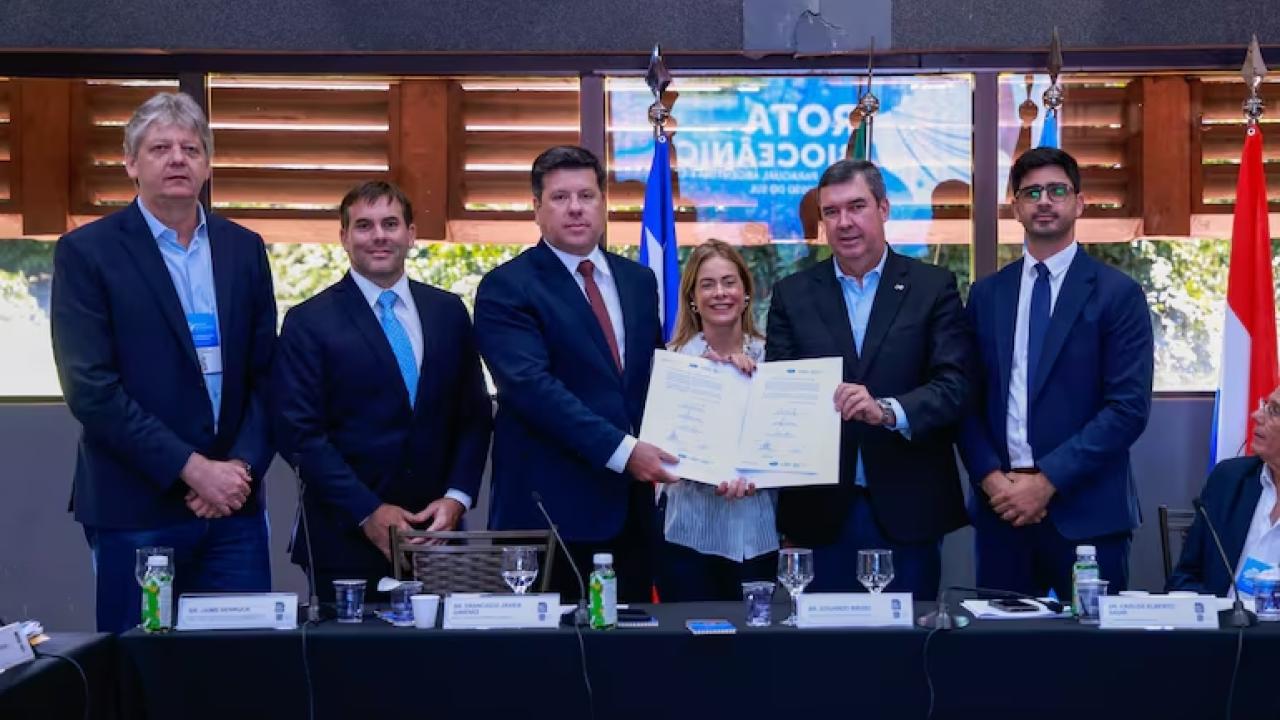
In Campo Grande, Mato Grosso do Sul, the first Memorandum of Understanding (MOU) between Brazil and Paraguay was signed this week for the bioceanic gas pipeline to pass through the Guaraní country, carrying gas from Vaca Muerta, Argentina, to the South American giant.
During the Sixth Forum of Subnational Governments of the Bioceanic Corridor, held last Wednesday in Campo Grande, a Memorandum of Understanding (MOU) established the will that the bioceanic gas pipeline - which requires a total investment of US$ 2 billion - pass through Paraguay and the Brazilian state of Mato Grosso do Sul.
This was stated by the Vice Minister of Mines and Energy, Mauricio Bejarano. The forum brought together leaders from Paraguay, Brazil, Argentina and Chile, who highlighted the importance of the Bioceanic Corridor as a fundamental logistics hub for international trade.
The event was attended by national and subnational authorities, representatives of the private sector and multilateral organizations.
Bejarano recalled that the memorandum signed by Brazil and Argentina established five possible routes, one of which is Paraguay and Mato Grosso do Sul to GasBol, which would also connect the São Paulo market.
"We have sent a trinational memorandum of understanding to both governments, Argentina and Brazil, through the Foreign Ministry, which is what we want to advance. But in parallel we are working with the Mato Grosso Governorate, which needs and wants this gas pipeline, more or as much as we do," he said.
Therefore, the will was established to work so that this gas pipeline passes through Paraguay and Mato Grosso do Sul, so that the Brazilian state and Paraguay can take this energy and introduce it into their generation matrices in our case, and in their case to supply the gas they bought from Bolivia, and which is running out of certified reserves.
GAS PIPELINE: THERE IS DEMAND
The project, promoted by the Vice Ministry of Mines and Energy of the Ministry of Public Works and Communications (MOPC) in conjunction with the Ministry of Industry and Commerce (MIC) of our country, will allow the export of natural gas from the geological formation of Vaca Muerta (Argentina) to Brazil, crossing Paraguayan territory and consolidating a strategic energy corridor for the region.
The participation of the Brazilian state of Mato Grosso do Sul, under the leadership of Governor Eduardo Riedel, is essential, since its consolidated demand for natural gas is key to the economic viability of the project, MOPC stressed.
As part of the agreement, a binational Working Group was created that will meet weekly to coordinate technical studies, define investments and ensure that the gas pipeline is efficiently integrated into the Bioceanic Corridor.
On the Brazilian side, the group will be coordinated by the Secretary of State for Environment, Development, Science, Technology and Innovation of Mato Grosso do Sul, and will include the Director-President of MS GÁS, together with technical specialists and advisors.
The Paraguayan delegation will be headed by the Vice Minister of Mines and Energy as coordinator, accompanied by the Director of Hydrocarbons and technical specialists and advisors from the MIC.
The group may expand or modify its composition through formal acts of each national coordination.
HOW WOULD IT BENEFIT TO HAVE THE GAS PIPELINE PASS THROUGH PARAGUAY?
The expected benefits of this initiative include the diversification of the Brazilian energy matrix, the reduction of dependence on Bolivian gas, the boost to industrial growth in Paraguay and Mato Grosso do Sul, the promotion of investments in infrastructure, the creation of employment and economic development, and the reduction of logistics costs.
The next steps include carrying out detailed technical studies to determine the optimal route for the pipeline, taking into account technical, environmental and logistical aspects.
The participation of private investors and strategic partners will also be sought to finance the project.
Energy integration will be complemented by the road, rail and port infrastructure being developed within the Bioceanic Corridor, positioning South America as a strategic block in global energy trade.
"This agreement marks a milestone in regional cooperation and lays the foundations for a more integrated and sustainable energy future in South America," said the MOPC.









